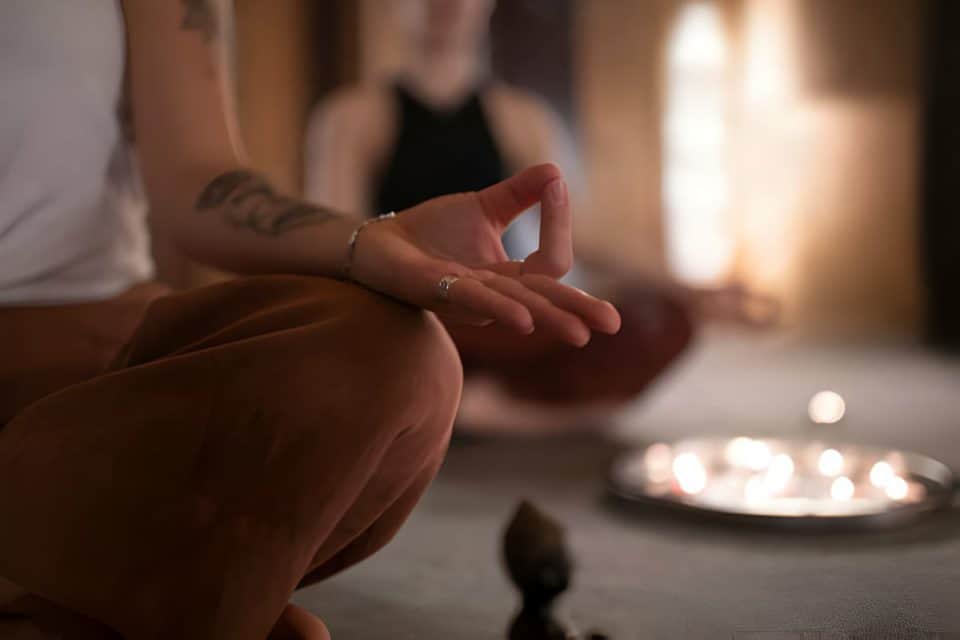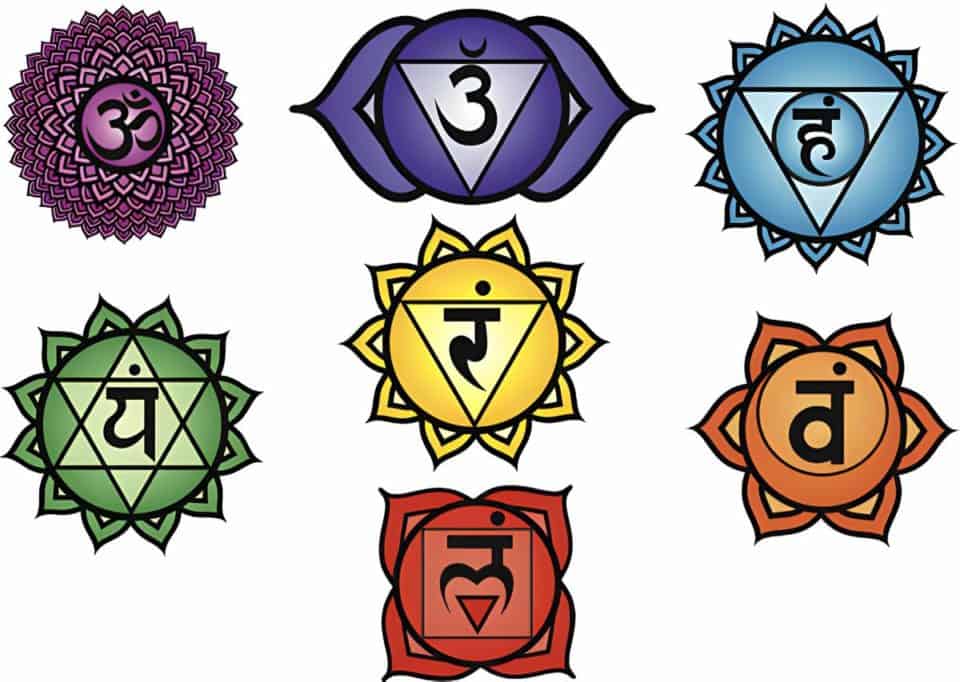Sacred syllables hold surprising healing abilities – if channeled correctly. These bija mantras, as yoga tradition calls them, tap into resonant frequencies to bring our energetic systems into harmony.
Yet, deciphering exactly which mantras balance which chakras often leave Westerners perplexed and unable to harness this transformative practice.
How do you unlock the power of bija mantras specifically tailored to heal your root, sacral, or third eye energy vortex when traditional resources rarely explain beyond complex Sanskrit?
In this blog post, we demystify the mystical by providing bija mantra breakdowns using easy phonetic spelling alongside actionable techniques for manifestation, emotional clearing, and whole being wellness.
With the help of intuitive channelers, energy healers, and Tantric masters, we’ll simplify how to chant for yogic alignment, whether at home, in studio classes, or during chakra meditation.
The Seven Chakras and Their Bija Mantras
Ready to unlock deeper healing and manifestation by chanting bija mantras tailored to your chakras? Let’s break down the vital energy centers in your subtle body and the seed syllables that activate each.
Root Chakra – Lam – Establishing Security
The Muladhara helps you feel grounded and secure, serving as the foundation of health and stability. Its bija mantra is Lam – pronounced “lum” – resonating with the earth element to bring feelings of confidence and connection.
Sacral Chakra – Vam – Releasing Repression
The svadhisthana oversees emotion, intimacy, and creativity. Vam – “vuum”- channels the water element to flow freely through relationships and creative expression.
Solar Plexus – Ram – Building Inner Strength
At the Manipura lies determination and willpower. Its bija mantra Ram – “rum” – burns bright with the fire element to stoke courage and conviction from within.
Heart Chakra – Yam – Discovering Compassion
The Anahata governs love, kindness, and harmony with all. Yam – “yuum” – permeates the air element to cultivate selfless caring and community.
Throat Chakra – Ham – Communicating Truth
The vishuddha oversees communication, honesty, and truth. Ham – “huum” – taps the ether element for inspired expression of your authentic voice.
Third Eye Chakra – Aum – Expanding Intuition
At Ajna resides insight, wisdom, and intuition. Aum – “ohm” – opens the light of understanding through psychic sight and beyond.
Crown Chakra – Silence – Connecting to Source
The Sahasrara at the cranial summit represents unity, consciousness, and oneness with all. No bija here – just silent, blissful communion.

How to Use Bija Mantras in Meditation
You now hold the transformative bija codes to align your chakras. Let’s properly harness this sacred sound technology through a structured mantra meditation.
Optimal Set-Up
Find a quiet, low-traffic space to avoid interruptions to this reflective work. Turn off devices and minimize lighting to reduce sensory stimulation. Sit comfortably, cross-legged or on a cushion, keeping the spine elongated. Before we begin, take a few deep cleansing breaths with closed eyes to clear the mind.
Chakra Concentration
Start by mentally focusing attention at the base of the spine, visualizing the red swirling life force energy here. Chant “Lum” aloud or silently for several rounds, feeling dense and grounded with each intonation.
Gradually shift to imagining fiery orange energy pulsing around your core, chanting “Vuum.”
Move upwards through the charting centers – strong yellow at the navel with “Rum,” loving green energy in the heart with “Yuum,” the cool blue throat illuminated by “Huum,” the indigo third eye igniting through “Ohm,” and finally a violet cascade filling your crown with soft, silent presence.
After completing the sequence, sit and breathe into total integration for as long as desired before gently stirring from meditation.
Optional Boosts
Enhance by holding corresponding gemstones, gesturing circular mudras, or envisioning yantras like the Sri Yantra during each bija focus.
Target specific chakras needing balance by chanting more repetitive rounds or incorporating customized visualizations for personal healing. Most importantly, stay open to subtle sensations and insights received with regular practice over time.
Benefits of Bija Mantra Meditation
Adopting a regular bija sadhana (practice) abundantly nurtures mind, body, and spirit. Let’s explore why chanting these primordial sounds proves such a powerful mindfulness tool.
Mental Magic
According to UCLA studies on chanting, Bija mantras order our often chaotic cognitions, enhancing concentration and emotional intelligence. This improves decision-making, information retention, mental endurance, and inner peace.
As yogi Amit often tells his students, “Single pointed focus on the bija within meditation makes the rest of life feel easier, no longer so scattered.”
Physical Perks
On a bodily level, bijas relax our nervous system, lower blood pressure, release feel-good endorphins and boost immunity according to recent emerging research.
Yogini Sarah reveals, “I haven’t been sick with a cold since dedicating to the chakra healing Lam chant daily. It’s strengthened my entire constitution.”
Spiritual Awakening
By resonating with our subtle, energetic anatomy, bija mantras awaken our connection to our source, each other, and our highest purpose. “I had read about bijas forever but only when I actually began chanting did I experience genuine mystical moments of oneness with everything,” laments author Savitri. “It’s transformed how I walk through the world.”
While individual mileage varies, these universal seed syllables undoubtedly quicken evolution through elevated alignment.
Consider adding bijas to supercharge your existing meditation routine or spark a standalone practice bearing profound fruit. Trust in the vibrational wisdom within Sanskrit’s sonic codes and lean into bijas as the portal guiding home.
Common Challenges and Tips for Success
Like any meditation, bija practice brings typical beginner growing pains before settling into transformational tranquility. Let’s address common obstacles and practical guidance to smooth the journey:
Distraction Derby
Our busy minds often race the second we close our eyes, pulling attention everywhere but the bija. When caught circling random thoughts, gently return focus to the seed syllable without judgment. Alternatively, chant aloud to reinforce mantra dedication. Creating an ongoing playlist with recordings of bijas in the background sustains centered immersion.
Forgetful Vocables
What did “Aum” resonate with again? Fumbling to recall param vibrations for each chakra is common initially. Keep our chakra/bija breakdown handy for reference until the associations imprint deeper through regular reminders.
Testing knowledge by covering the list and quizzing yourself periodically boosts information retention as well.
Clumsy Chanting
Unusual bija pronunciations may initially seem foreign to English speakers. Bookmark an online bija pronunciation guide to listen to and mimic.
Try easier vowels before tackling tricky consonant blends like “ichr,” relaxing the face and tongue until each bija flows more naturally. Allow imperfection while your instrument learns new mantric music.
Waning Willpower
Like any habit formation, bija discipline fluctuates. Set manageable duration goals starting with 5-10 minutes and slowly increasing over time.
Keep motivation alive by creating a mantra calendar checkpoint system. Recording reflective insights on mental/emotional states before and after sessions clarifies positive impacts. Most importantly, celebrate small daily wins rather than criticizing lapses. Progress over perfection!
Conclusion
With compassionate troubleshooting, a blossoming bija practice awaits. Embrace the ups and downs of devoted spiritual sadhana. Experiment with creative chanting rituals that feel nourishing. Let the lyrical medicine of Sanskrit syllables sustain energetic harmony through challenging or chaotic times.
With core roots anchored deep in fertile bija soil, life’s winds and weather grow more bearable. You’ve got this! Check our new blogs to know more about wholistic living.




